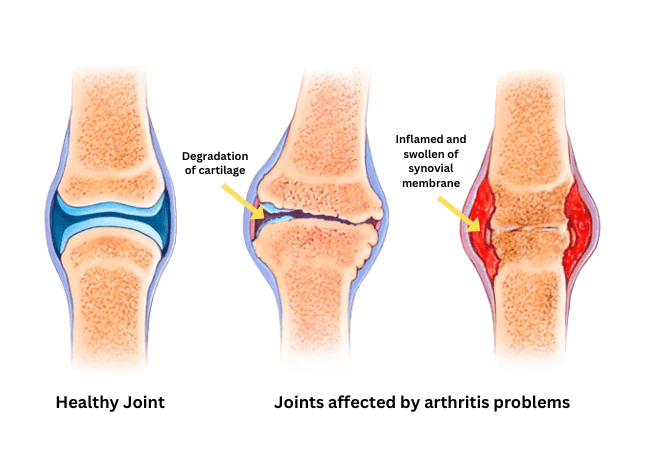Understanding Joint Pain: Tips of Managing Joint Pain
What is Joint Pain?
Does your body sometimes feel achy or stiff, especially at the joints in your knees, hips, hands, or back? That’s joint pain, a common issue where the bone connection points meet and get uncomfortable. There are many possible causes of joint pain. It might be caused by an injury or a longer-lasting problem such as arthritis.
The pain itself can feel like burning, throbbing, grinding, or just plain stiffness, especially mornings. Gentle movement can help loosen things up! But be careful, too much activity can make it worse.
Joint pain can make everyday tasks a challenge. In severe cases, it can seriously impact your quality of life
Causes and Symptoms of Joint Pain:
Joint pain can be a common ache, but the biggest culprit is often arthritis. This comes in two common types: osteoarthritis and rheumatoid arthritis. Both damage joints, but in different ways. In general, causes of joint pain involves:
- Wear-and-tear damage to a joint cartilage. This damage can result in bone grinding directly on the bone, which causes pain and restricted movement.
- Swelling of tissues in or around your joints due to extra fluid. It comes along with joint pain and stiffness.

Joint pain can be a pain! While some cases are mild, others can make it hard to move around. Here’s what you might experience:
- Swelling: Your joint might look puffy.
- Stiffness: It might feel tight, especially in the mornings.
- Pain: Movement can be uncomfortable or even painful.
- Restricted movement: It might be harder to bend or straighten your joint fully.
- Unusual sounds: You might hear clicking, grinding, or snapping when you move.
- Numbness: In some cases, you might experience a loss of feeling in the affected area.
Red flag! A hot and swollen joint needs immediate medical attention.
Management of Joint Pain:
While there’s no cure for arthritis pain yet, there are ways to feel better! Here are some tips:
Medications
Medical Treatment
Stay Active
Stretch Regularly
Maintain a Healthy Weight
Self-Care Tips
Joint pain management can be tackled in two ways: short-term relief and long-term management.
- Short-term relief: This aims to quickly reduce pain and inflammation caused by a flare-up.
- Long-term management: This focuses on protecting your joints and slowing down any damage.
Don’t suffer in silence! If your joint pain is unexplained or doesn’t improve after a few days, see your doctor. Early diagnosis can help identify the cause and get you on the road to feeling better.

 SALE
SALE 

